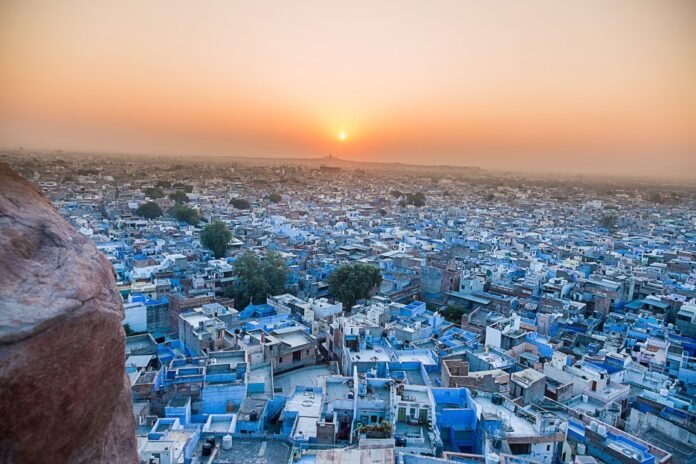Jodhpur, located in the heart of Rajasthan, India, is known as the “Blue City” because of the striking blue houses that adorn its landscape. The vibrant color of the buildings is more than just an aesthetic choice; it has deep historical and cultural roots. This article explores how Jodhpur became a magical blue city, delving into its history, the significance of the blue color, and the modern conveniences available for exploring this enchanting destination.
A Glimpse into History
Jodhpur was founded in 1459 by Rao Jodhaji, a leader of the Rajput clan. The city has a rich history marked by battles, trade, and royal patronage. The majestic Mehrangarh Fort, which looms over the city, was built to protect the kingdom from invasions and has become a symbol of Jodhpur’s strength and resilience. Over the centuries, the city flourished as a center of trade, connecting various parts of India and beyond.
The blue houses in Jodhpur can be traced back to the 19th century when the city’s Brahmin community began painting their homes blue. This choice was believed to signify their high status and distinction in society. Over time, more residents adopted the blue hue, creating a sea of blue that is now one of the city’s defining features. The color is not only visually appealing but also serves practical purposes, as it helps to keep the houses cooler during the hot summer months.
The Significance of the Color Blue
The blue color in Jodhpur is steeped in symbolism. For many, it represents tranquility, peace, and spirituality. In Hindu culture, blue is often associated with Lord Krishna, who is depicted with blue skin. The color is also thought to have protective qualities, warding off insects and keeping homes cool. As more people embraced this tradition, the blue houses transformed Jodhpur into a visually stunning city, attracting visitors from all over the world.
The impact of the blue color extends beyond the physical appearance of the city. It has fostered a sense of community among residents and has become a source of pride. As visitors walk through the narrow streets of the old city, they are often captivated by the vibrant blue facades and intricate designs. The color has become a part of Jodhpur’s identity, making it a must-visit destination for travelers seeking to experience its unique charm.
Exploring Jodhpur Today
Today, Jodhpur is a thriving city that beautifully blends tradition and modernity. Visitors can explore its rich heritage through various attractions, including the majestic Mehrangarh Fort, the stunning Jaswant Thada, and the bustling Sardar Market. Each of these sites showcases the city’s history and architectural beauty, offering a glimpse into the life of its past.
To make the most of your visit to Jodhpur, utilizing local transportation options can enhance your experience. With numerous Jodhpur local taxi services available, exploring the city and its surroundings becomes convenient and efficient. Whether you’re planning a visit to the fort, a trip to nearby villages, or a journey to the desert, local taxi services can provide you with the flexibility you need.
For those looking to venture beyond the city limits, Jodhpur taxi service offers easy access to nearby attractions, including the stunning Umaid Bhawan Palace and the picturesque Osian village. These day trips allow visitors to immerse themselves in the rich culture and history of the region while enjoying the comfort of reliable transportation.
Conclusion
Jodhpur’s transformation into the magical Blue City is a fascinating story of history, culture, and community. The striking blue houses, born out of tradition and symbolism, have turned the city into a captivating destination that enchants every visitor. With the convenience of local taxi services, exploring Jodhpur and its surroundings has never been easier. As you wander through its blue-hued streets, you’ll find that Jodhpur is not just a city; it’s an experience that captures the heart and imagination.
4o mini


